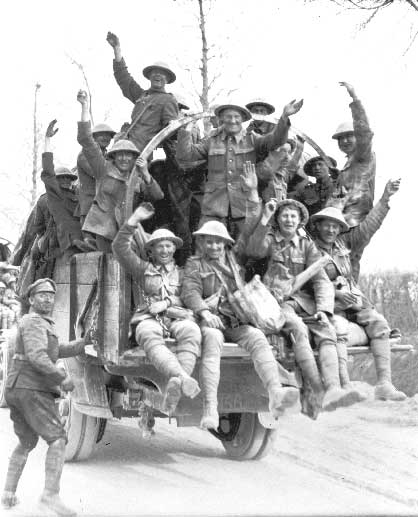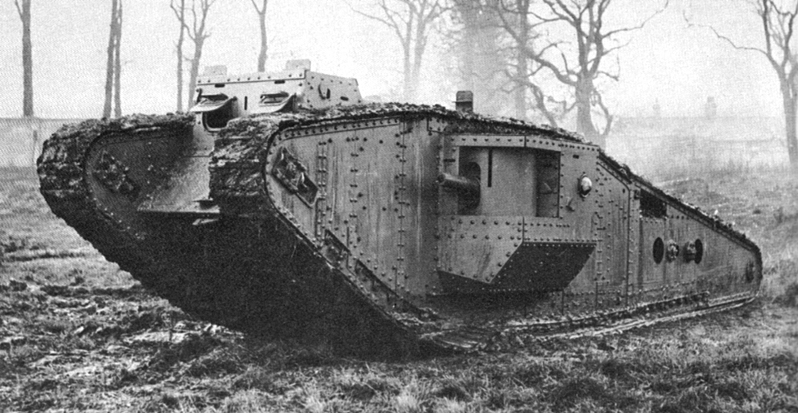Even more disastrous is to reverse Clausewitz’s principle and allow military considerations to dominate national policy. The “absurdity” in Clausewitz’s view, has been perpetuated more often by Clausewitz’s own countrymen than by anyone else. In 1914, the Schlieffen Plan called for an immediate German attack on Belgium and France in the event of war betwen Russia and Austria. Once Russia had announced general mobilization, therefore, German diplomacy was completely shackled by military timetables. This not only made war inevitable but added Great Britain to Germany’s enemies. And the Schlieffen Plan, with its awful political implications, had never been discussed or formally approved by any German government!

—From the Accrington Pals wiped out on the Western Front to the fleeing Iraqi conscripts caught in what one US airman described as a “turkey-shoot,” twentieth-century warriors can be forgiven for thinking that warfare is indeed inhuman and insane. But the appeal of the modern theory of war as something beyond rationality is that it excuses the policy-makers and generals who make the decisions.
Theories which summon up the rage of the unconscious, the spectre of willed machines and “smart” missiles, the march of human automatons, and the rapacious and self-generating “military industrial complexes” have contributed to the belief that war is beyond human comprehension and control. Without a rational guiding principle, war can be presented as an unstoppable technological vortex of violence and mass destruction.—Read More:http://www.clausewitz.com/readings/CaleReview.htm image:http://www.cbc.ca/news/arts/theatre/story/2009/08/11/f-billy-bishop-goes-to-war-gray-peterson.html
After 1916, when Ludendorff became virtual dictator of Germany, he made tow momentous decisions that brought Germany down in catastrophic defeat. At the beginning of 1917 he persuaded the Kaiser to sanction unrestricted submarine warfare in the hope that it would “win” the war. The ruthlessness of such warfare made it certain that no kind of compromise peace-Germany,s only real hope- would be acceptable to Allied public opinion, and it also brought the united States into the war. And at the beginning of 1918, the submarines having failed, Ludendorff launched a series of giant offensives on the western front. There was no attempt to put these in the context of reasonable peace offers; they therefore served no political purpose, and yet it was now beyond Germany’s strength to “win” the war by military action. In the autumn, as Germany began to collapse, Ludendorff demanded instant peace to save his army, instead of backing peace negotiations by continued military resistance, and this final absurdity completed the German catastrophe.

—During the Cold War, the Bomb was seen to dominate issues of war and peace. Today, the Patriot missile, “smart” bombs, satellites, and guided mini-nukes appear to reign over conflict in the post-Cold War world.
The unstoppable-technology theories have the practical effect of denigrating politics, and absolving those responsible from blame. Wars do not start by themselves: they start because external political interests decide war is expedient to the powers that be. As the conservative British military historian Michael Howard rightly notes, “However inchoate or disreputable the motives for war may be, its initiation is almost by definition a deliberate and carefully considered act and its conduct…a matter of very precise central control. If history shows any record of accidental wars, I have yet to find them” (The Causes of Wars, 1983, ).—Read More:http://www.clausewitz.com/readings/CaleReview.htm
It is not, however, Clausewitz’s fundamental concept of the conduct of war that has made the most historical impact. This is partly Clausewitz’s own fault, for instead of treating it in a set piece at the beginning of the work, he scatters references to it throughout, mainly dealing with it in the last book. His opening set piece is, in fact, a philosophical analysis of the nature odf war. And apparently- although only apparently- it contradicts all he goes on to say about how, in real life, war is moderated by political considerations.
“War therefore,” he writes, ” is an act of violence intended to compel our opponent to fulfill our will.” Violence leads to reciprocal violence, so that war tends ever to extremes- a concept now dressed up in fashionable jargon such as words like “escalation.” Therefore it is absurd to introduce any principle of moderation into the philosophy of war.

—The loss of rational principle in war also enables the military thinkers to present war – at least the wars of which they disapprove – as the activity of crazies governed by deep-seated atavistic impulses. This is especially true since the end of the political divide of East and West that used to suggest at least a semblance of ideological differences. Today, wars are invariably seen in anthropological terms. Conflicts which have been spawned by Great Power realpolitik are redefined as wars caused by ancient tribal and ethnic animosities. Culture, not politics, is taken to be the well-spring of militarism.—Read More:http://www.clausewitz.com/readings/CaleReview.htm image:http://boivieapedia.pbworks.com/w/page/8081157/World%20War%201
It is this opening analysis, abounding as it does in memorably pungent phrases, that has come to epitomize Clausewitz for generations of careless or selective readers and to serve as the basis of all later demands for “total war,” for outright victory, and for unconditional surrender. But, in fact, as Clausewitz tried to make clear, he was referring not to real war but to war in its ideal philosophical nature… ( to be continued)





 COMMENTS
COMMENTS